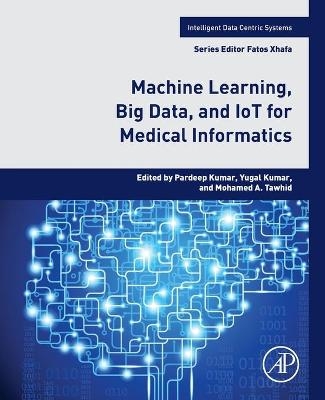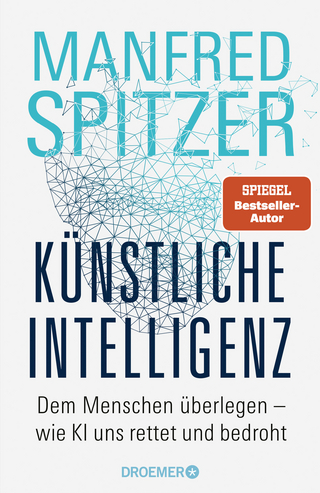
Machine Learning, Big Data, and IoT for Medical Informatics
Academic Press Inc (Verlag)
978-0-12-821777-1 (ISBN)
In medical informatics, machine learning, big data, and IOT-based techniques play a significant role in disease diagnosis and its prediction. In the medical field, the structure of data is equally important for accurate predictive analytics due to heterogeneity of data such as ECG data, X-ray data, and image data. Thus, this book focuses on the usability of machine learning, big data, and IOT-based techniques in handling structured and unstructured data. It also emphasizes on the privacy preservation techniques of medical data.
This volume can be used as a reference book for scientists, researchers, practitioners, and academicians working in the field of intelligent medical informatics. In addition, it can also be used as a reference book for both undergraduate and graduate courses such as medical informatics, machine learning, big data, and IoT.
Dr. Pardeep Kumar is currently working as an Associate Professor in the Department of Computer Science and Engineering at Jaypee University of Information Technology, Waknaghat, Solan, India, and has more than 14 years of experience in academia. Previously, he was associated with Mody University of Technology and Science, Laxmangarh, Sikar, Rajasthan. He completed his PhD in Computer Science and Engineering at Uttarakhand Technical University, Dehradun. He obtained his MTech in Computer Science and Engineering from Guru Jambheshwar University of Science and Technology, Hisar, Haryana, and his BTech in Information Technology from Kurukshetra University, Kurukshetra, Haryana. Dr. Kumar has been appointed as Associate Editor of the IEEE Access journal, as well as Guest Editor of several SCI and Scopus Index journals of international repute. Dr. Yugal Kumar is currently working as an Assistant Professor (senior grade) in the Department of Computer Science and Engineering at Jaypee University of Information Technology, Waknaghat, Solan, India. He completed his PhD in Computer Science and Engineering at the Birla institute of Technology, Mesra, Ranchi, and has now more than 14 years of teaching and research experience. He has presented and published more than 80 research papers, as well as participated in various national and international conferences. He is serving as a member of the editorial review board of various journals including PLOS ONE, Journal of Advanced Computational Intelligence and Intelligent Informatics, and Journal of Information Processing System. Mohamed A. Tawhid earned his PhD in Applied Mathematics from the University of Maryland Baltimore County, Maryland, United States. From 2000 to 2002, he was a postdoctoral fellow at the Faculty of Management, McGill University, Montreal, Quebec, Canada. Currently, he is a Professor at Thompson Rivers University, Kamloops, British Columbia, Canada. He has published more than 75 peer-reviewed research papers, 13 book chapters and edited four special issues in international journals. He has also co-authored a book published by Springer. His research has been funded by Natural Sciences and Engineering Research Council (NSERC) grants. Moreover, he has served on several journals' editorial boards and worked on several industrial projects in Canada. Fatos Xhafa, PhD in Computer Science, is Full Professor at the Technical University of Catalonia (UPC), Barcelona, Spain. He has held various tenured and visiting professorship positions. He was a Visiting Professor at the University of Surrey, UK (2019/2020), Visiting Professor at the Birkbeck College, University of London, UK (2009/2010) and a Research Associate at Drexel University, Philadelphia, USA (2004/2005). He was a Distinguished Guest Professor at Hubei University of Technology, China, for the duration of three years (2016-2019). Prof. Xhafa has widely published in peer reviewed international journals, conferences/workshops, book chapters, edited books and proceedings in the field (H-index 55). He has been awarded teaching and research merits by the Spanish Ministry of Science and Education, by IEEE conferences and best paper awards. Prof. Xhafa has an extensive editorial service. He is founder and Editor-In-Chief of Internet of Things - Journal - Elsevier (Scopus and Clarivate WoS Science Citation Index) and of International Journal of Grid and Utility Computing, (Emerging Sources Citation Index), and AE/EB Member of several indexed Int'l Journals. Prof. Xhafa is a member of IEEE Communications Society, IEEE Systems, Man & Cybernetics Society and Founder Member of Emerging Technical Subcommittee of Internet of Things. His research interests include IoT and Cloud-to-thing continuum computing, massive data processing and collective intelligence, optimization, security and trustworthy computing and machine learning, among others. He can be reached at fatos@cs.upc.edu. Please visit also http://www.cs.upc.edu/~fatos/ and at http://dblp.uni-trier.de/pers/hd/x/Xhafa:Fatos
1. Predictive analytics and machine learning for medical informatics: A survey of tasks and techniques 2. Geolocation-aware IoT and cloud-fog-based solutions for healthcare 3. Machine learning vulnerability in medical imaging 4. Skull stripping and tumor detection using 3D U-Net 5. Cross color dominant deep autoencoder for quality enhancement of laparoscopic video: A hybrid deep learning and range-domain filtering-based approach 6. Estimating the respiratory rate from ECG and PPG using machine learning techniques 7. Machine learning-enabled Internet of Things for medical informatics 8. Edge detection-based segmentation for detecting skin lesions 9. A review of deep learning approaches in glove-based gesture classification 10. An ensemble approach for evaluating the cognitive performance of human population at high altitude 11. Machine learning in expert systems for disease diagnostics in human healthcare 12. An entropy-based hybrid feature selection approach for medical datasets 13. Machine learning for optimizing healthcare resources 14. Interpretable semi-supervised classifier for predicting cancer stages 15. Applications of blockchain technology in smart healthcare: An overview 16. Prediction of leukemia by classification and clustering techniques 17. Performance evaluation of fractal features toward seizure detection from electroencephalogram signals 18. Integer period discrete Fourier transform-based algorithm for the identification of tandem repeats in the DNA sequences 19. A blockchain solution for the privacy of patients' medical data 20. A novel approach for securing e-health application in a cloud environment 21. An ensemble classifier approach for thyroid disease diagnosis using the AdaBoostM algorithm 22. A review of deep learning models for medical diagnosis 23. Machine learning in precision medicine
| Erscheinungsdatum | 25.06.2021 |
|---|---|
| Reihe/Serie | Intelligent Data-Centric Systems |
| Mitarbeit |
Herausgeber (Serie): Fatos Xhafa |
| Zusatzinfo | Approx. 110 illustrations; Illustrations, unspecified |
| Verlagsort | San Diego |
| Sprache | englisch |
| Maße | 191 x 235 mm |
| Gewicht | 930 g |
| Themenwelt | Informatik ► Theorie / Studium ► Künstliche Intelligenz / Robotik |
| ISBN-10 | 0-12-821777-4 / 0128217774 |
| ISBN-13 | 978-0-12-821777-1 / 9780128217771 |
| Zustand | Neuware |
| Haben Sie eine Frage zum Produkt? |
aus dem Bereich


